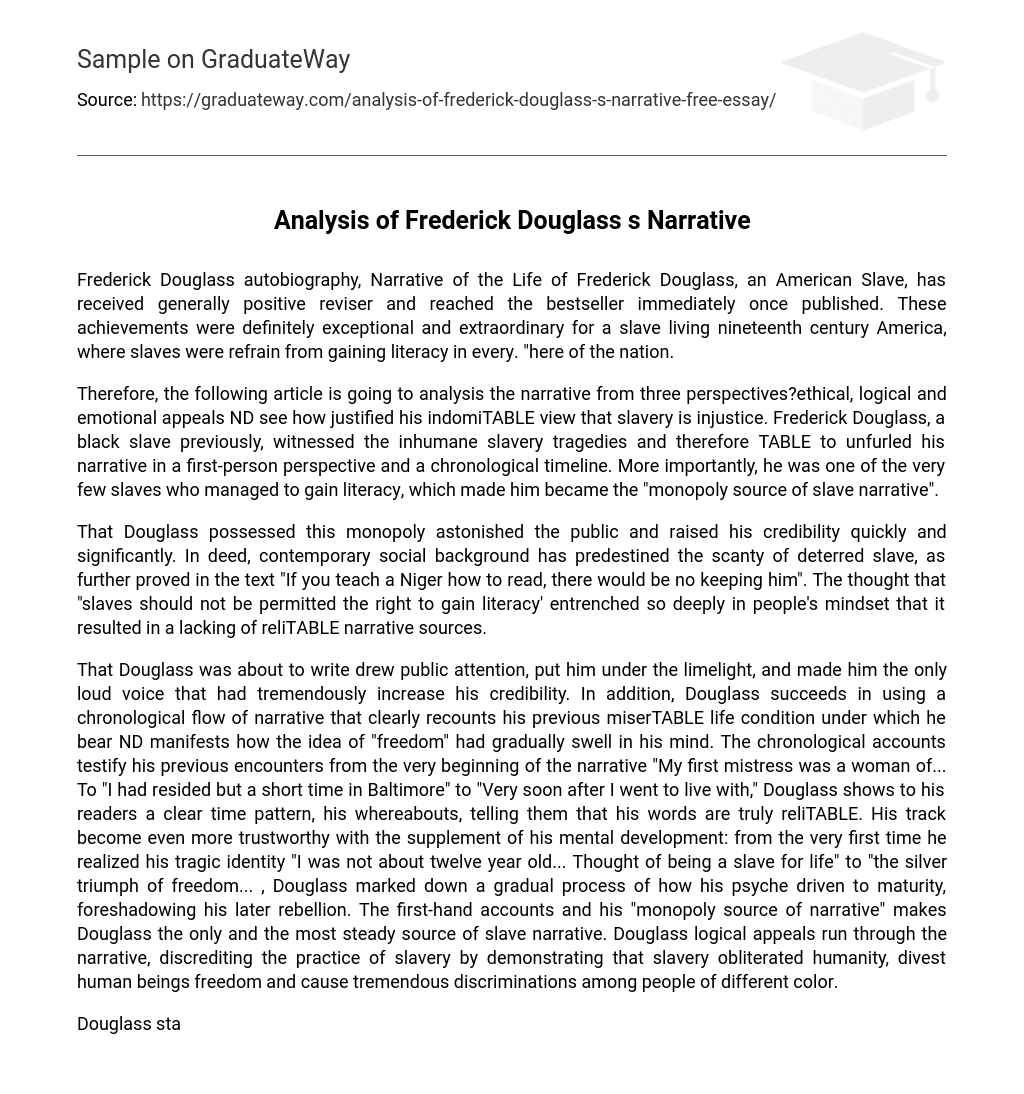The autobiography of Frederick Douglass, titled Narrative of the Life of Frederick Douglass, an American Slave, received favorable reviews and quickly became popular. The achievements of this 19th century American slave were particularly notable considering that slaves were forbidden from learning to read and write in any part of the country.
In this article, we assess Frederick Douglass’ firm belief that slavery is unfair by examining his narrative from three angles: ethical, logical, and emotional appeals. As a former black slave who personally endured the horrors of slavery, Douglass chose to recount his experiences in a first-hand and chronological manner. Importantly, he distinguishes himself as one of the rare slaves who attained literacy, thus establishing himself as the ultimate authority on slave narratives.
The fact that Douglass had this exclusive control amazed the public and greatly increased his credibility. Indeed, the societal circumstances of the time predetermined the suppression of enslaved individuals, as demonstrated further in the statement “If you teach a Niger how to read, there would be no keeping him.” The belief that “slaves should not be allowed to become literate” was so deeply ingrained in people’s thinking that it led to a scarcity of reliable narrative sources.
The fact that Douglass was about to write drew public attention, putting him under the limelight, and making him the only loud voice that had significantly increased his credibility. Additionally, Douglass successfully uses a chronological flow of narrative that clearly recounts his previous miserable life condition, showing how the idea of “freedom” gradually grew in his mind. The chronological accounts attest to his past experiences, from the very beginning of the narrative “My first mistress was a woman of…” to “I had resided but a short time in Baltimore” to “Very soon after I went to live with.” Douglass presents a clear timeline and his whereabouts, indicating that his words are truly reliable. His credibility is further enhanced by his mental development: from the first time he realized his tragic identity “I was not about twelve years old… Thought of being a slave for life” to “the silver triumph of freedom…,” Douglass chronicles the gradual process of how his psyche matured, foreshadowing his later rebellion. The firsthand accounts and his “monopoly source of narrative” make Douglass the only and most reliable source of slave narrative. Douglass uses logical appeals throughout the narrative, discrediting the practice of slavery by demonstrating that it erases humanity, deprives individuals of freedom, and causes tremendous discrimination based on skin color.
Douglas begins his narrative by describing his initial encounter with his mistress. He portrays her as a woman with great warmth and sensitivity. However, as the narrative progresses, Douglas reveals that this initial kindness deteriorated quickly after his mistress accepted the institution of slavery. This drastic change illustrates how slavery could completely erase a person’s compassion, regardless of how tolerant they may have been before.
In his speech, Douglass emphasizes the inequality of slavery, stating that it restricts slaves both physically and mentally. Slaves are closely monitored and confined to separate rooms for extended periods of time. Additionally, they are denied the opportunity to educate themselves, as illustrated by Douglass’ own experience. Despite his mistress initially teaching him how to read and write, her husband intervenes, warning against empowering a slave with education as it may lead to rebellion.
From a modern perspective, it is seen as unjust and a violation of the Constitution that slaves were denied the opportunity to gain literacy. The fact that they were not even allowed to consider the possibility of becoming literate adds to this injustice. What made matters worse for Douglass was his intense fixation on the concept of freedom. He expressed, “That was the first time I had the idea of freedom… Get rid of thinking… I should have killed myself.” These inner thoughts reveal the despair that consumed Douglass’s mind when he acquired some literacy and realized he would remain enslaved for life. Emotional appeals play a significant role in Frederick Douglass’s narrative as he uses powerful language to depict their harsh living conditions and internal struggles, successfully eliciting empathy from his audience, particularly present-day readers. Specifically, he recounts his own challenges with his mistress and shares tragic experiences witnessed while under others’ control, including witnessing inhumane treatment inflicted upon his companions and beloved grandmother.
Douglass, being a victim himself, was able to share the stories of others as well as his own experiences. In his account of the confrontation with his mistress, Douglass highlights the importance of his soliloquy, the expression of his inner emotions. Phrases such as “… Torment and sting my soul to unutterable open my eye to the horrible pit, but to no ladder open which to get out” convey that the torment he felt was not just physical, but also like an intense fire burning in his heart that could not be extinguished; it was like having ants in his pants.
The use of sharp contrast in Douglass’ work exposes the immense suffering endured and the complete absence of freedom, compelling society as a whole to reject the unjust practice of slavery. When it comes to assessing his credibility, it becomes apparent that external circumstances like the scarcity of educated slaves and the morally corrupt societal values, along with Douglass’ own endeavors, catapulted him to become the unchallenged authority in slave narratives.
Reading Douglass’ poignant recounts of his personal tragic experiences and stories is emotionally challenging, but these narratives effectively appeal to the emotions of his audience and bring about sadness. Overall, Douglass’ Narrative of the Life of Frederick Douglass, an American Slave serves as a powerful testament to the period of slavery in American history. It is the outcome of the interaction between an exceptional individual and a society that was still in its infancy. Looking at it from a contemporary perspective, it undoubtedly provides the most persuasive testimony of the era of slavery.





